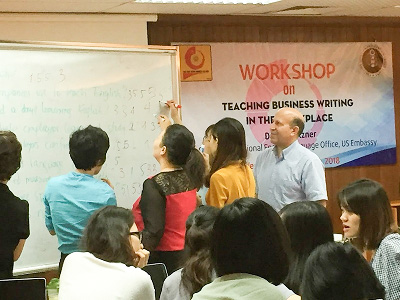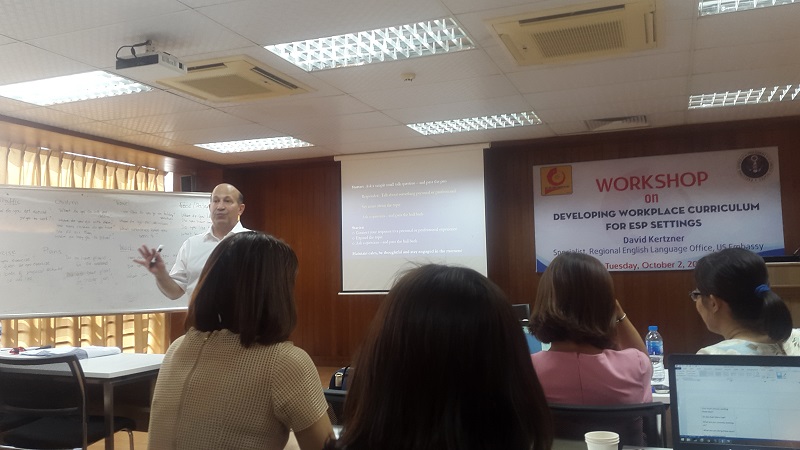 |
All Blog postings by David Kertzner: Beyond Buzzwords Getting the Entire Global Team on the Communication Highway Suddenly a Remote Trainer? Make it Engaging! The Turbulent Future of Work Culture in a Multicultural Company ProActive English - Teacher Training in Vietnam Language and Leadership The Confidence Gap |
David Kertzner
November 2018
I recently returned from Vietnam where I had the privilege of leading teacher training workshops at Hanoi University of Industry, working with teachers in the English for Occupational Purposes program. My trip was sponsored by the U.S. State Department through the English Language Specialist program which assists U.S. Embassies in delivering and maintaining quality English language programs overseas and promoting mutual understanding between the U.S. and other countries.
I was also invited to give the opening keynote address at VietTESOL 2018 with its focus on “English language education in the industrial revolution 4.0: Meeting the needs of the dynamic labor market”.
It was an exciting two weeks, to say the least.
My keynote address was titled From University Classrooms to Company Training Rooms: A Path for EFL teachers and EFL Curriculum and focused on the challenge English teachers face to be prepared for a future in Vietnam that includes onsite training at companies. The speech presented overview data on why Vietnam continues to be an attractive location for companies seeking offshore facilities: continued relatively low labor costs and, more significantly to our field, the increase in English fluency among young people. I shared examples of language training activities that can take place in onsite programs. The companies I referenced in each of my examples already have locations in Vietnam, suggesting that the teachers in the audience might have the opportunity to lead training at these facilities. The speech concluded with encouragement to conference attendees to continue their hard and productive work – and know that their efforts will bring meaningful results.
My real work, though, took place in the 10 days before the conference.
Dr. Duyen Tran at HaUI, who coordinated my visit, has completed an exhaustive study of the English language requirements at workplaces in Vietnam covering 7 professional fields including Business, Electronics, Information Technology, Tourism and Hospitality, Automobiles, Fashion and Garment Technology and Environmental Technology. Results of the study identified uses of English in professional contexts and graduates’ opinions on the usefulness of their university English language education for their work. As an outcome of the study, faculty of Foreign languages are making efforts to change curriculum and improve assessment through innovative approaches in language education and human resource development. Teachers, themselves, are being empowered to make these changes. Previous English Language Specialists at HaUI over the past few years have done an outstanding job working with the university instructors to help develop the curriculum.
In my role, I led three workshops on EOP curriculum and content development for HaUI teachers. I also held a series of Curriculum Review Meetings with leaders of EOP Faculty and met with IT staff to discuss evaluation of Web-based learning tools.
The three workshops were titled:
|
 |
Each workshop was designed to demonstrate experiential learning with workshop participants engaging in a learner-centered process that they could then share in their classrooms. Workshop attendees got very involved in the experience and identified meaningful takeaways to apply to HaUI program development. Key takeaways from workshops and curriculum review meetings included:
- Move away from traditional teacher-to-student classroom direction and move towards transferring power over learning from teacher to student. Incorporate more project-based learning experiences in the classroom as a parallel to the model of many companies that empower employees to think critically and engage creatively as part of a team.
- Reduce vocabulary lists and paired grammar / scripted dialog exercises generated from other sources. Focus more on language generated by students presenting their areas of interest. Do not focus on mastery and eliminating errors. Instead, focus on strategic communication and engagement.
- Give students choices wherever possible. With control over content and the opportunity to present their own material, student learning experience will be richer, and the teacher’s job is less stressful (though still requiring significant effort).
- Continue to engage with experts (such presenters at the VietTESOL conference) on alternative forms of assessment, including project-based assessment and portfolio review.
Three other visiting speakers at the conference added to the high level of professional dialog during my stay.
- Dr. Margaret Kettle from Queensland University of Technology, Australia gave a wonderful presentation titled Written Corrective Feedback for Second Language Uptake and Learner Autonomy: Teacher and Student Experiences of Informing and Improving Practice.
- Dr. Johanna Motteram of the British Council in Singapore gave an engaging speech titled Human Language in an Age of Disruption: Nurturing Critical Skills for a Dynamic Labour Market.
- Dr. Tin Dang from Ho Chi Minh City University of Technology and Education spoke about Learner Autonomy Promoting Practice: Constructivist Tasks in Virtual Learning Space.
In addition to experiencing the thorough professionalism of our Vietnamese colleagues throughout my visit, I was also deeply appreciative of the personal warmth of the Vietnamese people in making my visit as comfortable and good-humored as it could be. The food was diverse, very tasty and plentiful. Hanoi was far more accessible than I had imagined, and the Old Quarter felt authentic and interesting. The only negative side effect of my visit is my now occasional nightmare involving chaotic traffic circles and scooters coming at me from any direction!
Finally, I could not stop myself from celebrating the path to World Series Championship of the Boston Red Sox, so I borrowed an electric guitar at the Conference Gala Dinner and led a perplexed, but enthusiastic group of celebrants in a round of Take Me Out to the Ballgame. I believe I will still be invited back, after that!

